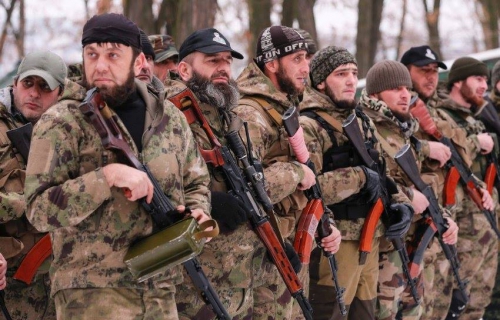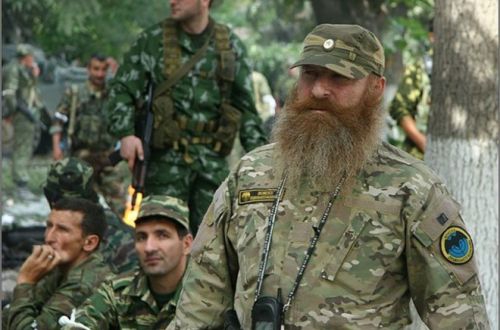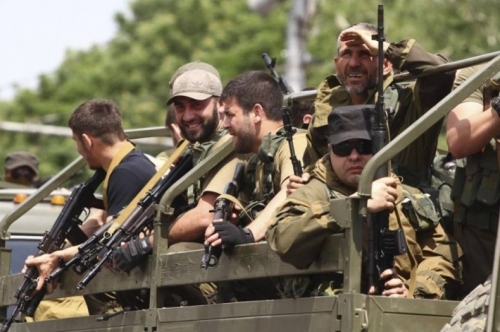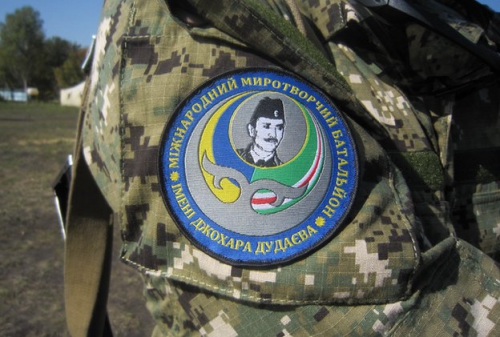vendredi, 13 mars 2015
L'Empire du Chaos s'installe en Europe: l' État islamique en Ukraine

L'Empire du Chaos s'installe en Europe: l' État islamique en Ukraine
Kiev et les djihadistes: une sombre alliance
Alors que nous combattons l’État islamique, l’EI, alias ISIS, en Irak et en Syrie, et que les responsables américains soulignent le prétendu danger d’une attaque sur le territoire américain, Washington et le Califat se battent du même côté en Ukraine. Dans une remarquable série d’articles dans l’Intercept, Marcin Mamon s’est penché sur un aspect du conflit en Ukraine auquel personne d’autre n’a fait attention: le rôle joué par le Bataillon Doudaïev, «une force de combat des islamistes radicaux composée de Tchétchènes, mais incluant également des combattants de tout le Caucase ainsi que quelques Ukrainiens».
Les clés des organisations clandestines islamistes en Ukraine ont été remises à Mamon par un contact à Istanbul,Khalid, qui commande la branche ISIS locale. «Nos frères sont là», a-t-il dit à Mamon, et le journaliste s’est rendu en Ukraine où il a été mis en rapport avec un contact nommé Ruslan, qui l’a conduit au camp clandestin de Munayev.
Portant le nom du premier président de la Tchétchénie séparatiste, Djokhar Doudaïev, le bataillon Doudaïev était commandé par Isa Munayev, récemment tué dans l’est de l’Ukraine. Imprégnés d’une haine fanatique des Russes, qui soutiennent les rebelles de l’Est, les hommes de Munayev estiment également qu’ils paient une dette, puisque les bataillons du Secteur Droit ultra-nationaliste qui aujourd’hui luttent pour Kiev ont apparemment aidé les Tchétchènes dans le passé. Le Secteur Droit est un groupe paramilitaire ouvertement néo-fasciste qui a fourni une grande partie des forces qui ont rendu possible le coup d’État contre Viktor Ianoukovitch, l’ancien président ukrainien. Organisés en différents bataillons, dont la célèbre Brigade Azov, ils idolâtrent les collaborateurs nazis de la Seconde Guerre mondiale, qui ont combattu les troupes soviétiques: les ultra-nationalistes ont été accusés d’avoir commis desatrocités dans le Donbass, ainsi que de terroriser leurs adversaires politiques sur le front intérieur. D’après Mamon, ils ont également été impliqués dans la lutte contre les Russes dans la lointaine Tchétchénie, où l’ancien gros bonnet du Secteur Droit Oleksandr Muzychko a combattu aux côtés de Munayev et des frères contre les Russes.
Comme Ruslan l’a dit à Mamon:
« Je suis ici aujourd’hui parce que mon frère, Isa, nous a appelés et a dit: ‹Il est temps de rembourser votre dette. Il fut un temps où les frères de l’Ukraine sont venus [en Tchétchénie] et se sont battus contre l’ennemi commun, l’agresseur, l’occupant.›. »
A côté de cette solennelle éthique du guerrier, une autre raison probable du soutien de l’EI à Kiev est l’accès à des cibles occidentales, données ainsi aux terroristes. Comme Mamon l’indique:
«L’Ukraine est en train de devenir une étape importante pour les frères comme Ruslan. En Ukraine, vous pouvez acheter un passeport et une nouvelle identité. Pour 15 000 dollars, un combattant reçoit un nouveau nom et un document juridique attestant de sa citoyenneté ukrainienne. L’Ukraine ne fait pas partie de l’Union européenne, mais c’est une voie facile pour l’immigration vers l’Ouest. Les Ukrainiens ont peu de difficultés à obtenir des visas pour la Pologne voisine, où ils peuvent travailler sur les chantiers et dans les restaurants, comblant le vide laissé par les millions de Polonais qui sont partis à la recherche de travail au Royaume-Uni et en Allemagne. »
On nous dit que l’EI prévoit des attaques terroristes en Europe, et que les forces de sécurité sont occupées à recenser tous les suspects du continent; pourtant voici ce trou béant dans les défenses de l’Ouest, par où les frères s’infiltrent tranquillement, sans que les médias occidentaux en rendent compte. En coopération avec des groupes ultra-nationalistes comme le Secteur Droit, qui ont également créé leurs bataillons semi-autonomes, les islamistes d’Ukraine, brandissant des passeports ukrainiens, ont ouvert une passerelle vers l’Ouest.

Les demandes faites à Washington de commencer à fournir des armes létales au régime ukrainien font maintenant partie du débat de politique étrangère à Washington, avec les habituels suspects exhortant l’administration à ouvrir le robinet d’armement. Pourtant, les Ukrainiens disent qu’ils obtiennent déjà une aide létale de pays qu’ils refusent d’identifier, selon le membre officiel du Conseil de sécurité nationale ukrainienne Oleg Gladovsky:
«[L’aide provient] d’endroits où nous n’avons aucune influence et où il n’y a pas de tollé public à ce sujet (que nous avons nous-mêmes contribué à créer dans certains endroits, malheureusement). C’est de ces pays que nous sommes en train de recevoir de l’aide létale.»
Alors d’où vient cette aide?
«Dans l’est de l’Ukraine, écrit Mamon, le drapeau vert du djihad flotte sur certaines bases des bataillons privés.» Mais comment ces groupes de combat sont-ils privés?
L’armée ukrainienne en loques, composée de conscrits peu motivés et mal armés, ne fait pas le poids contre les séparatistes, qui se battent sur leur propre territoire contre un envahisseur. Le régime de Kiev dépend de ces arméesprivées pour fournir une colonne vertébrale à sa force de combat, et il semble y avoir une relation symbiotique difficile entre l’armée ukrainienne régulière et ces volontaires, avec une approche non interventionniste adoptée par Kiev pour ces derniers . Si le régime ukrainien reconnait ouvertement aujourd’hui obtenir de l’aide de pays non nommés, il est normal de se poser la question: le Bataillon Doudaïev obtient-il une aide directe à partir des mêmes sources que celles qui équipent en armes les rebelles islamistes radicaux de Syrie – le Qatar, le Koweït, les Émirats arabes unis et les Saoudiens?
Comme les rebelles modérés syriens financés et soutenus par les Etats-Unis rejoignent l’EI en masse, le réseau djihadiste international étend ses tentacules en Ukraine pour reprendre le combat au nom de leurs frères.
L’un des principaux liens entre les factions ultra-nationalistes ukrainiennes et les islamistes était Oleksandr Muzychko, qui a combattu aux côtés du chef terroriste tchétchène Chamil Bassaïev – le cerveau derrière le massacre de l’école de Beslan – dans les guerres de Tchétchénie. L’année dernière, Muzychko a été tué dans une fusillade avec les policiers ukrainiens. Mais avant de disparaître, il était le visage public très évident du mouvement ultra-nationaliste d’Ukraine.
Dans une vidéo devenue virale, Muzychko et un groupe de ses compagnons du commando Secteur Droit sont entrés dans le bureau du procureur de la ville de Rivne, dans le nord-ouest de l’Ukraine, et ont giflé le procureur coupable de ne pas faire son travail à la satisfaction de Muzychko. Il a également fait irruption dans une réunion du conseil de la ville de Rivne, brandissant un fusil, et déclarant que le Secteur Droit ne désarmerait jamais. Alors que les autorités ont sans aucun doute trouvé les singeries de Muzychko ennuyeuses, ce genre de chose est normal dans la nouvelle Ukraine. Et il est probable que c’est son implication clandestine avec l’EI, bien plus que ses pitreries publiques, qui a provoqué la colère des autorités: elles lui ont tendu une embuscade et l’ont abattu le 24 mars de l’année dernière. Son implication avec la cellule EI en Ukraine est-elle devenue de plus en plus évidente, même pour ceux en Occident qui s’étaient contentés de regarder de l’autre côté?
Que les autorités de Kiev travaillent avec un avant-poste de l’EI est implicite dans toute l’article de Mamon: quand ce dernier s’est rendu au campement de Munayev en compagnie de Ruslan, ils n’ont eu aucune difficulté aux points de contrôle de l’armée ukrainienne, où la possibilité de percevoir des pots de vin ne faisait aucun doute, et ils sont passés à travers. Tout au long de l’article de Mamon nous entendons Munayev se plaindre de la pauvreté: le Bataillon Doudaïev, nous dit-on, doit dépendre d’activités criminelles pour financer le djihad. Pourtant, un oligarque mineur, nommé Dima leur remet 20 000 dollars, et il est question de vendre au marché noir de l’ambre à des «acheteurs du golfe Persique, y compris de riches cheikhs» – peut-être les mêmes riches donateurs qui ont si généreusement financé l’EI.
Les liens entre le régime de Kiev et l’enclave de l’EI en Ukraine sont nombreux, et seulement à demi cachés. Lorsque Mamon est arrivé au camp de Munayev, il a été accueilli par une voiture blindée qui, nous dit-on, a été donnée par Ihor Kolomoisky, l’un des hommes les plus riches d’Ukraine, récemment nommé gouverneur de Dniepropetrovsk. Kolomoisky, malgré son héritage juif, n’a aucun scrupule à s’allier à des groupes ouvertement antisémites comme le Secteur Droit, dont il a financé les bataillons: comme les djihadistes affiliés à l’EI, auxquels il a offert une voiture blindée, il ne pense qu’à la lutte contre Vladimir Poutine, qu’il méprise.
Une autre indication de l’alliance EI-Kiev est l’évasion d’Adam Osmaev, commandant-adjoint du Bataillon Doudaïev, d’une prison ukrainienne où il purgeait une peine pour avoir fomenté l’assassinat de Poutine. Après le coup d’état à Kiev, Munayev et ses compagnons ont fait sortir Osmaev de prison: quand ils ont été confrontés à la police ukrainienne à un barrage, ils ont été mystérieusement autorisés à passer. Comme le rapporte Mamon:
«Après une impasse dramatique, les Ukrainiens ont permis aux Tchétchènes de filer. (Il n’y a pas moyen de confirmer le récit de Ruslan, mais à l’automne 2014, le tribunal d’Odessa a soudainement déclaré qu’Osmaev avait suffisamment purgé sa peine et il a été libéré.) Osmaev et Munayev sont revenus à Kiev, et le bataillon Doudaïev a été créé.»
«De temps en temps, écrit Mamon, Munayev rencontre des représentants du Service de sécurité ukrainien, connu sous le nom de SBU.»
Le Bataillon Doudaïev compte environ 500 combattants, mais il y a aussi d’autres brigades djihadistes en Ukraine, organisées dans le Bataillon Sheikh Mansour, qui s’est détaché du Bataillon Doudaïev et «est basé à proximité de Marioupol, dans le sud-est de l’Ukraine», ainsi que deux autres groupes composés des Tatars de Crimée, comptant chacun environ 500 djihadistes.
Comme l’aide des États-Unis coule à flot en Ukraine, dans quelle mesure va-t-elle retomber sur ces alliés de l’EI – et quelle sera son utilisation future? Si John McCain et Lindsey Graham arrivent à leurs fins, les armes américaines vont bientôt se trouver dans les mains de ces terroristes, dont il est sûr que le djihad contre les Russes se tournera vers l’Ouest et frappera les capitales de l’Europe.
C’est un retour de flamme avec une vengeance: nous créons nos propres ennemis, et leur donnons les armes pour nous faire du mal, alors même que nous affirmons notre besoin d’une surveillance universelle pour les combattre. Les savants fous formulant la politique étrangère américaine sont en train de créer une armée de monstres de Frankenstein – qui ne manqueront pas d’attaquer leurs créateurs bercés d’illusions.
- Source : Justin Raimondo-Traduction Claude Saker Francophone
00:05 Publié dans Actualité, Affaires européennes, Géopolitique | Lien permanent | Commentaires (0) | Tags : actualité, europe, affaires européennes, politique internationale, ukraine, mer noire, caucase, tchétchènes, terroristes tchétchènes |  |
|  del.icio.us |
del.icio.us |  |
|  Digg |
Digg | ![]() Facebook
Facebook
jeudi, 12 mars 2015
The Kiev-ISIS Alliance

The Kiev-ISIS Alliance
Militants with links to ISIS fight for Kiev in East Ukraine as part of 'Dzhokhar Dudayev battalion'
This article originally appeared at Antiwar.com
While we’re fighting the Islamic State, a.k.a. ISIS, in Iraq and Syria, and American officials tout the alleged danger of an attack on the US homeland, in Ukraine Washington and the Caliphate are fighting on the same side. A remarkable series of articles by Marcin Mamon in The Intercept has documented an aspect of the Ukraine conflict that no one else has paid any attention to: the role played by the "Dudayev Battalion," a fighting force of radical Islamists consisting of Chechens, but also including fighters from throughout the Caucasus as well as some Ukrainains.
The keys to Ukranie’s Islamist underground were handed to Mamon by a contact in Istanbul, "Khalid," who commands the ISIS branch there. "Our brothers are there," he told Mamon, and the reporter traveled to Ukraine where he was put in touch with a contact named Ruslan, who led him to Munayev’s clandestine camp.
Named after the first "president" of breakaway Chechnya, Dzhokhar Dudaev, the Dudayev Battalion was commanded by Isa Munayev, recently killed in a east Ukraine. Imbued with a fanatical hatred of the Russians, who are backing the rebels in the east, Munayev’s men also feel they are paying back a debt, since the ultra-nationalist Right Sector battalions now fighting for Kiev apparently helped the Chechens in the past. Right Sector is an openly neo-fascist paramilitary group which provided much of the muscle that made the coup against Viktor Yanukovych, former Ukrainian president, possible. Organized into various battalions, including the notorious Azov Brigade, they idolize the World War II collaborators with the Nazis, who fought Soviet troops: the ultra-nationalists have been accused of carrying out atrocities in the Donbass, as well as terrorizing their political opponents on the home front. According to Mamon, they also have been involved in fighting the Russians in far-off Chechnya, where former Right Sector bigwig Oleksandr Muzychko fought alongside Munayev and "the brothers" against the Russians. As Ruslan told Mamon:
"I am here today because my brother, Isa, called us and said, ‘It’s time to repay your debt. There was a time when the brothers from Ukraine came [to Chechnya] and fought against the common enemy, the aggressor, the occupier."
Aside from this solemn warrior ethic, another likely reason for ISIS support to Kiev is the access this gives the terrorists to Western targets. As Mamon puts it:
"Ukraine is now becoming an important stop-off point for the brothers, like Ruslan. In Ukraine, you can buy a passport and a new identity. For $15,000, a fighter receives a new name and a legal document attesting to Ukrainian citizenship. Ukraine doesn’t belong to the European Union, but it’s an easy pathway for immigration to the West. Ukrainians have few difficulties obtaining visas to neighboring Poland, where they can work on construction sites and in restaurants, filling the gap left by the millions of Poles who have left in search of work in the United Kingdom and Germany."
We are told that ISIS is planning terrorist attacks in Europe, and security forces are busy rounding up suspects all across the continent – and yet here is this gaping hole in the West’s defenses, where "the brothers" are quietly infiltrating without much notice in the Western media. In cooperation with ultra-nationalist groups like Right Sector, which have also formed their semiautonomous battalions, the Islamists of Ukraine, brandishing Ukrainian passports, have opened a gateway to the West.
Demands that Washington start giving lethal aid to the Ukrainian regime are now part of the foreign policy debate in Washington, with the usual suspects urging the administration to open the weapons spigot. Yet the Ukrainians are saying they’re already getting lethal aid from countries they refuse to identify, according to Ukrainian national security council official Oleg Gladovsky:
"[The aid is coming from] places where we have no influence and where there’s no public uproar about it (which we ourselves have helped created in some places, unfortunately). It’s from these countries that we’re now receiving lethal aid."
So where is this aid coming from?
"In eastern Ukraine," writes Mamon, "the green flag of jihad flies over some of the private battalions’ bases." But how "private" are these fighting groups?
The tatterdemalion Ukrainian army, consisting of poorly-motivated and poorly-armedconscripts, is a poor match for the separatists, who are fighting on their home turf against an invader. The Kiev regime is dependent on these "private" armies to provide the backbone of its fighting force, and there appears to be an uneasy symbiotic relationship between the regular Ukrainian army and these volunteers, with a hands-off approach taken by Kiev to the latter. If the Ukrainian regime is now openly acknowledging getting aid from unnamed countries, it’s fair to ask: is the Dudayev Battalion getting direct aid from the same sources supplying Syria’s radical Islamist rebels with arms – Qatar, Kuwait, the United Arab Emirates, and the Saudis?

As the US-funded-and –supported Syrian "moderate" rebels defect to ISIS in droves, the international jihadist network is extending its tentacles into Ukraine to take up the fight on behalf of their "brothers."
One of the key links between the Ukrainian ultra-nationalist factions and the Islamists was Oleksandr Muzychko, who fought alongside Chechen terrorist leader Shamil Basayev – the mastermind behind the Beslan school massacre – in the Chechen wars. Last year Muzychko was killed in a shoot-out with Ukrainian police, but before he went down he was the very visible public face of Ukraine’s ultra-nationalist movement.
In a video that went viral, Muzychko and a group of his fellow Right Sector stormtroopers entered the state prosecutor’s office in the city of Rivne, in northwestern Ukraine, and slapped the prosecutor around for not doing his job to Muzychko’s satisfaction. He also broke into a meeting of the Rivne city council, brandishing a gun, and declaring Right Sector would never disarm. While the authorities no doubt found Muzychko’s antics annoying, this sort of thing is "normal" in the new Ukraine, and it’s likely his involvement with the ISIS underground, rather than his public antics, brought down the ire of the authorities, who ambushed and shot him down on March 24 of last year. Was his involvement with the ISIS cell in Ukraine was becoming increasingly obvious, even to those in the West who had been content to look the other way?
That the Kiev authorities are working with the ISIS outpost is implied throughout Mamon’s piece: as Mamon made his way Munayev’s encampment in the company of Ruslan, they had no trouble at Ukrainian army checkpoints, where the opportunity to collect bribes was foregone and they were waved right through. Throughout Mamon’s piece we hear Munayev’s complaints of poverty: the Dudayev Battalion, we are told, must depend on criminal activities to finance their jihad. Yet one minor oligarch, named "Dima," hands them $20,000, and there is talk of selling black market amber to "buyers in the Persian Gulf, including wealthy sheikhs" – perhaps the same wealthy donors who have so generously funded ISIS.
The links between the Kiev regime and the ISIS enclave in Ukraine are numerous, and only half-hidden. When Mamon arrived at Munayev’s camp, he was met by an armored car that, we are told, was donated by Ihor Kolomoisky, one of the richest men in Ukraine who was recently appointed governor of Dnipropetrovsk. Kolomoisky, despite his Jewish heritage, has no compunctions about allying himself with openly anti-Semitic groups like Right Sector, whose battalions he has financed: like the ISIS-affiliated jihadists he gifted with an armored car, all he cares about is the fight against Vladimir Putin, whom he despises.
Another indication of the ISIS-Kiev alliance is the escape of Adam Osmayev, deputy commander of the Dudayev Battalion, from a Ukrainian jail, where he had been serving a sentence for plotting Putin’s assassination. After the coup in Kiev, Munayev and his fellow fighters broke Osmayev out of prison: when they were confronted by Ukrainian police at a checkpoint, they were mysteriously allowed to pass. As Mamonreports:
"After a dramatic standoff, the Ukrainians allowed the Chechens to go free. (There is no way to confirm Ruslan’s account, but in the fall of 2014, the Odessa court suddenly declared that Osmayev had fulfilled enough of his sentence and had been set free). Osmayev and Munayev came back to Kiev, and the Dudayev battalion was created."
"From time to time," writes Mamon, "Munayev met with representatives of the Ukrainian Security Service, known as the SBU."
The Dudayev Battalion numbers around 500 fighters, but there are also other jihadist brigades in Ukraine, organized into "the Sheikh Mansour battalion, which broke off from the Dudayev battalion" and "is based close to Mariupol, in the southeast of Ukraine," as well as two other groups composed of Crimean Tatars, each consisting of about 500 jihadists.
As US aid flows into Ukraine, how much of it will trickle down to these allies of ISIS – and to what future use will it be put? If John McCain and Lindsey Graham have their way, US arms will soon find their way into the hands of these terrorists, whose jihad against the Russians is bound to turn westward and strike at the capitals of Europe.
This is blowback with a vengeance: we are creating our own enemies, and giving them the weapons to harm us, even as we claim the need for universal surveillance in order to fight them. The mad scientists formulating US foreign policy are raising an army of Frankenstein monsters – who are sure to come after their deluded creators.
00:05 Publié dans Actualité, Géopolitique | Lien permanent | Commentaires (0) | Tags : actualité, affaires internationales, europe, affaires européennes, tchétchènes, terroristes tchétchènes, ukraine, donbass, donetsk, russie, eiil |  |
|  del.icio.us |
del.icio.us |  |
|  Digg |
Digg | ![]() Facebook
Facebook


